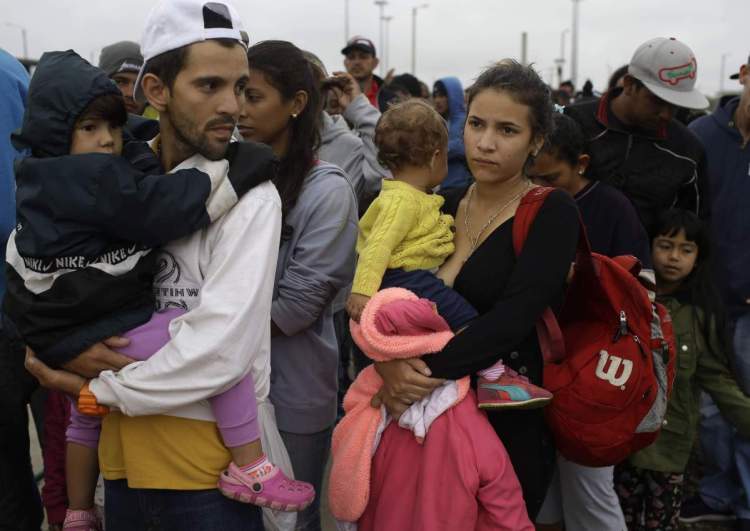AGUAS VERDES, Peru — Thousands of Venezuelans fleeing their nation’s economic and humanitarian crisis rushed to reach Peru on Friday before stiffer new rules go into effect that will make entering the South American nation more difficult.
Tired men, women and children, many lugging their belongings in suitcases, lined up at the Peru-Ecuador border to pass through migration authorities before Saturday, when Venezuelans will be required to present a passport to enter Peru.
Peru’s new measure follows in the footsteps of other nations that have been swamped with hundreds of thousands of Venezuelans. Authorities say the measure is necessary to know who is entering the country and what happens to them, but critics and rights groups warn it will only lead migrants to take more dangerous routes. While Peru doesn’t share a border with Venezuela, many migrants try to reach it by going through Ecuador or Colombia, believing they will have a better shot at finding a job or obtaining legal status.
Obtaining a passport has becoming increasingly difficult in Venezuela, where hyperinflation is expected to reach 1 million percent by the end of this year and there are shortages of basic supplies like paper and ink.
“We are being very open but we need a correct identification,” said Interior Minister Mauro Medina, as he rolled out a new digital fingerprint system that also is being put in place. “It’s important for whatever might happen in the future.”
The United Nations estimates 2.3 million Venezuelans have fled since 2014 as the country with the world’s largest proven oil reserves plummets into an economic crisis worse than the Great Depression. Most are now leaving by land through Colombia, where more than 1 million have arrived in the last two years. Authorities in Ecuador say there are about 200,000 Venezuelans now living in the country, while in Peru the number has rapidly climbed to over 400,000.
Peru’s economy is expected to grow by 4 percent this year and many Venezuelans already have at least one relative living in the nation. Some 73,000 Venezuelans have been given temporary legal status allowing them to live and work in the country while another 108,000 have applied.
Former President Pedro Pablo Kukzynski, who resigned from office amid a corruption scandal earlier this year, was also one of the region’s most outspoken leaders in decrying Venezuelan President Nicolas Maduro for human rights abuses and for pushing through the creation of a powerful new pro-government assembly to overrule an opposition-dominated legislature.
In major cities like Lima, it’s now not uncommon to see Venezuelans selling coffee or playing music along the side of the road.
“We are so grateful for the love we’ve received,” said Carlos Rodriguez, a Venezuelan migrant entering Peru on Friday.
The stricter entry requirements come a week after a similar measure by Ecuador, which began requiring Venezuelans to present a passport. Colombia also requires Venezuelans to have a passport or a special border card in order to enter, but many enter by skirting border posts, so the new Peruvian and Ecuadoran rules leave those people trapped in Colombia.
Copy the Story LinkSend questions/comments to the editors.



Success. Please wait for the page to reload. If the page does not reload within 5 seconds, please refresh the page.
Enter your email and password to access comments.
Hi, to comment on stories you must . This profile is in addition to your subscription and website login.
Already have a commenting profile? .
Invalid username/password.
Please check your email to confirm and complete your registration.
Only subscribers are eligible to post comments. Please subscribe or login first for digital access. Here’s why.
Use the form below to reset your password. When you've submitted your account email, we will send an email with a reset code.